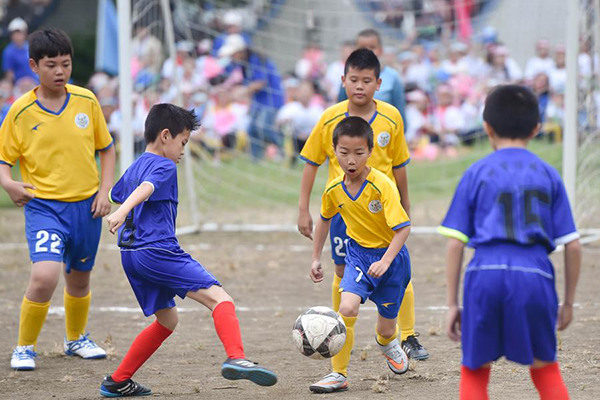
Pupils play football in the 1st School Football Culture Festival of Xiangban Primary School in Fuzhou, the capital of Southeast China's Fujian province, on May 20, 2016. (Photo/Xinhua)
In recent weeks the global media have been invaded by news or just rumors about Chinese billionaires buying controlling stakes in European soccer clubs and acquiring top European players to play in the Chinese Super League.
The latest supposed deal is about buying the majority stake in A.C. Milan, one of the most prestigious and successful European clubs, by Chinese investors. This follows the acquisition of about 70 percent shares of Inter Milan, another leading European club by the Nanjing-based Suning Holding Group. According to some data, since last year Chinese companies have invested more than $1.7 billion in sports, the majority of it in soccer.
For Europeans, this sudden and big appetite of Chinese investors for soccer business has not come as a big surprise because huge Chinese investments have already flowed into other sectors. But soccer is different from technology, fashion brands or company assets. It is part of culture, tradition and education where shortcuts are not allowed.
This year, during my frequent stays in China, I decided for the first time to watch some Chinese Super League matches. I have to confess that sometimes I got bored and had the strong desire to leave the stadium before the games ended. Lower technical levels, poor possession skills and weaker physique of the players, or the inexperience of the coaches cannot fully explain the disappointment of so many Chinese soccer fans.
"Kick everything with one leg" is a suitable Chinese expression. It means one person doing everything by oneself, from the smallest to the biggest task.
The ball in soccer games, like relations with clients in businesses or sharing information in social life, is primarily used to score goals. If you pass the ball to others, you can miss an opportunity to score a goal. And this is where the fault lies.
Chinese culture is gradually becoming less collectivistic due mainly to the severe social competition in many aspects of daily life, from getting children admitted "good" schools to gaining a hukou (household registration) in a city. Under such circumstances, teachers and parents focus on individual growth to prepare students to win competitions and gain personal credits. The skills and talent needed to work or play in a team are overlooked; in fact, they are considered outdated traits that create obstacles for personal success.
Many European and even more so South American children start playing soccer just for fun and with passion and not for money or fame. I have seen a lot of Chinese soccer players with great individual abilities but to be an excellent team player one has to be different and requires something more. Soccer is about sharing, of learning to work and interact with others, and of forgetting about personal benefits. The best players are those who always know where their teammates are on the field and can "feel" what they are going to do next with the ball. Teamwork is a kind of chemistry, which we cannot simply buy.
If China really wants to be a global soccer power, it should devote the largest resources and efforts to a new sport education program that catches 'em young (starts with young children) rather than paying huge sums to import demotivated foreign players or making expensive investments in troubled foreign clubs. Qualified and modern coaches should educate children and parents that soccer before being a business is a sport that requires sacrifice, mutual respect, honesty, cooperation, patience, skill and creativity, and offers joy, individual growth and progress.
In particular, Chinese children and players should learn that in the end, it is not so important who scores the goal and in a global competition a team can never win if a player selfishly keeps the ball without passing it. Soccer is similar to life and business: if you don't give, you don't get.
Airaldo Piva, the author, is CEO of HG Europe and Honorary Professor at Hengdian College of Film and Television.


















































